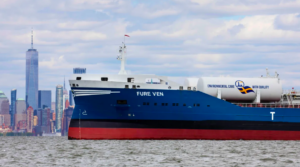
Step towards fossil-free shipping as Furetank secures biogas supply

Swedish shipping company Furetank has signed a letter of intent with Eskilstuna Biogas, enabling the development of a new biogas plant producing around 5,000 tonnes of LBG (liquefied biogas) annually.
Furetank has committed to buying at least 75% of the produced fuel for 10 years. The gas will be extracted from manure and food waste from the municipalities of Eskilstuna and Strängnäs, which is upgraded to a 100% waste-based, fossil-free and renewable biofuel, LBG.
Furetank says it strives to be a leader in climate and environmentally efficient shipping. It’s developed a new series of vessels that are best in class globally, according to the climate standards for shipping set by the IMO. Today these vessels operate mainly on liquefied natural gas, LNG, but the ambition from the start has been to switch over to LBG as soon as possible.
“It feels fantastic to access liquefied biogas in Sweden,” says CEO Lars Höglund. “With LBG produced in the right way, we can run our vessels completely without emitting CO2 or harmful particles. This is a strategic move. We developed the new efficient vessels, chose gas as a fuel and offset remaining emissions. Now we move on to securing our own supply of LBG.”
The biogas plant will be the largest environmental investment in Eskilstuna in 20 years and corresponds to almost 10% of the municipality’s total greenhouse gas emissions, according to Kaj Wågdahl, Eskilstuna Biogas AB Chairman of the Board.
The project will receive approximately SEK 140 million in grants from the Swedish Environmental Protection Agency’s support for climate investments. An agreement with a large customer was a requirement for obtaining financing.
Production is planned to start in the last quarter of 2023 and Furetank says it will be one step ahead when all shipping companies need to start paying for their carbon dioxide emissions.
“We became the first shipping company in Sweden and second in the world to bunker LBG in 2018. For us it was a statement; we want to head in this direction. Now we have a clear plan for the transition and are negotiating more contracts in Sweden and other European locations. It feels incredibly good. The whole organisation enjoys being involved in pushing this development forward and showing that it is possible,” says Höglund.
